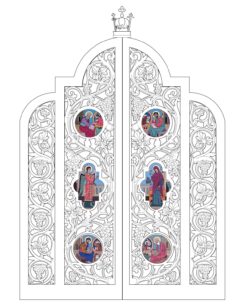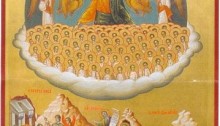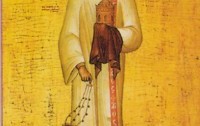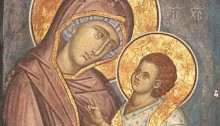When the Magi from the east did not return to Jerusalem from Bethlehem to inform Herod about the newborn King but rather, at the angel’s command, returned to their homeland another way, Herod became as enraged as a wild beast and ordered all the children two years old and under in Bethlehem and its surroundings to be killed. This frightening command of the king was carried out to the letter. His soldiers beheaded some of the children with swords, smashed others against stones, trampled others underfoot, and strangled others with their hands. And the cries and wails of the mothers rose to heaven, Lamentation, and bitter weeping; Rachel weeping for her children (Jeremiah 31:15, Matthew 2:18), as had been prophesied. This crime against the multitude of innocent children was carried out a year after the birth of Christ, at the time when Herod was seeking to find the Divine Child. He asked Zacharias about his son John, so that he might kill him, since he naturally thought that John was the new king. As Zacharias did not turn John over, he was slain in the Temple by order of Herod. St. Simeon the God-receiver would also have been murdered soon after the Presentation in the Temple, had he not already reposed in God. After murdering the children of Bethlehem, Herod turned against the Jewish elders who had revealed to him where the Messiah would be born. He then killed Hyrcanes, the high priest, and the seventy elders of the Sanhedrin. Thus, they who had agreed with Herod that the new Child-king must be killed came to an evil end. After that, Herod murdered his brother, sister, wife and three sons. Finally, God’s punishment came to him: he began to tremble, his legs became swollen, the lower part of his body became putrid, and worms came out of the sores; his nose became blocked and an unbearable stench emanated from him. Before his last breath, he remembered that there were many captive Jews in prison, and he ordered that they all be killed so that they would not rejoice in his death. Thus, this terrible ruler gave up his inhuman soul and handed it over to the devil for eternal possession. (Prologue of Ohrid) Continue reading December 29, 2013 Sunday after the Nativity of our Lord God and Saviour Jesus Christ Holy and Just Joseph, King David and James, Brother of the Lord in the Flesh Octoechos Tone 7
Continue reading December 29, 2013 Sunday after the Nativity of our Lord God and Saviour Jesus Christ Holy and Just Joseph, King David and James, Brother of the Lord in the Flesh Octoechos Tone 7
Day: 7 December 2013
December 27, 2013 Holy Apostle, First Martyr and Archdeacon Stephen
Stephen was a kinsman of the Apostle Paul and one of those Jews who lived in the Hellenic provinces. Stephen was the first of the seven deacons whom the holy apostles ordained and appointed to the service of assisting the poor in Jerusalem. For this, he is called the archdeacon. By the power of his faith, Stephen worked great miracles among the people. The wicked Jews disputed with him, but they were always defeated by his wisdom and the power of the Spirit, Who acted through him. Then the shameful Jews, accustomed to calumnies and slander, incited the people and the elders of the people against the innocent Stephen, slandering him as though he had blasphemed against God and against Moses. False witnesses were quickly found who confirmed this. Stephen then stood before the people, and all saw his face as it had been the face of an angel (Acts 6:15), that is, his face was illumined with the light of grace as was once the face of Moses when he spoke with God. Stephen opened his mouth and enumerated the many good works and miracles that God had performed in the past for the people of Israel, as well as the many crimes and opposition to God on the part of this people. He especially rebuked them for the killing of Christ the Lord, calling them betrayers and murderers (Acts 7:52). And while they gnashed their teeth, Stephen beheld and saw the heavens open and the glory of God. That which he saw, he declared to the Jews: Behold, I see the heavens opened and the Son of Man standing on the right hand of God! (Acts 7:56). Then the malicious men took him outside the city and stoned him to death. Among his persecutors was his kinsman Saul, later the Apostle Paul. At that time, the Most-holy Theotokos, standing on a rock at a distance with St. John the Theologian, witnessed the martyrdom of this first martyr for the truth of her Son and God, and she prayed to God for Stephen. This occurred one year after the descent of the Holy Spirit upon the apostles. Gamaliel, a prince of the Jews and a secret Christian, clandestinely took St. Stephen’s body and buried it on his own estate. Thus, this first among the Christian martyrs gloriously reposed and took up his habitation in the Kingdom of Christ God. (Prologue of Ohrid) Continue reading December 27, 2013 Holy Apostle, First Martyr and Archdeacon Stephen
Continue reading December 27, 2013 Holy Apostle, First Martyr and Archdeacon Stephen
December 26, 2013 Synaxis of the Most Holy Mother of God
On the second day of the Nativity, the Christian Church gives glory and thanksgiving to the Most-holy Theotokos, who gave birth to our Lord, God and Savior Jesus Christ. This feast is called “the Synaxis” because on this day all of the faithful gather to glorify her, the Most-holy Theotokos, and to solemnly and universally celebrate a feast in her honor. In Ohrid, it has been the tradition from ancient times that, on the eve of the second day of Nativity, Vespers has been celebrated only in the Church of the Most-holy Theotokos called the Chieftain [Èelnica]. All the clergy with the people gather together to glorify the Most-pure Mother of God. (Prologue of Ohrid) Continue reading December 26, 2013 Synaxis of the Most Holy Mother of God
Continue reading December 26, 2013 Synaxis of the Most Holy Mother of God



